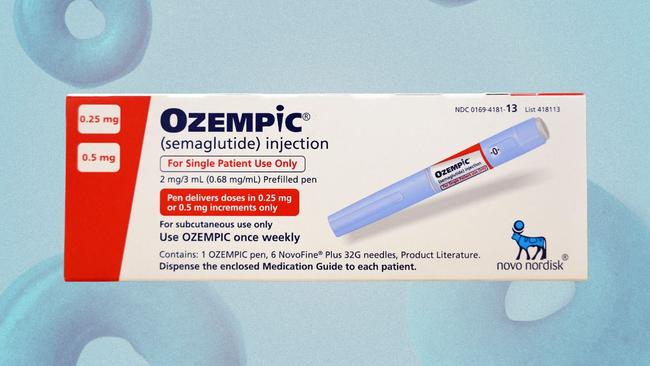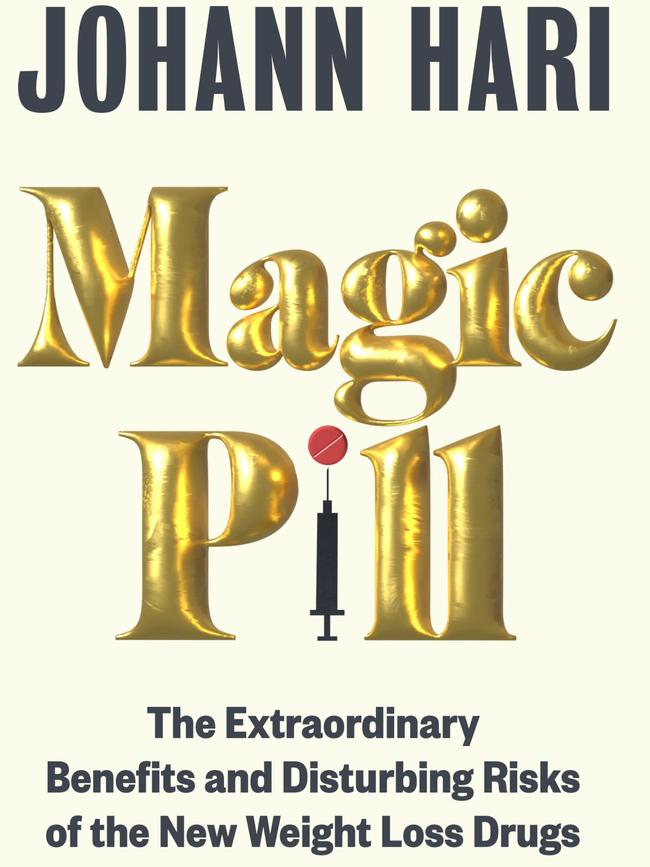Our food system is poisoning us, but is a drug the answer?
Johann Hari says he cured his fast food fetish with Ozempic, but now calls it ‘potential poison’

One Christmas Eve Johann Hari went to his local KFC and placed an order. Before he left, the man serving him asked him to wait a minute. He went back into the kitchen, then returned with all the staff, bearing a Christmas card. “They had addressed it, ‘To our best customer’, and all written personal messages,” Hari recalls.
“My heart sank,” he writes, “because I thought: This isn’t even the fried chicken shop I come to the most.”
Today Hari is no longer their best customer. There are, in fact, terrible portents for the world’s fried chicken shops. And not just chicken. Last year one investment bank downgraded its advice on Krispy Kreme doughnuts stock for the same reason.
That reason? Hari, and much of the world, has started taking Ozempic, a drug that suppresses appetite and leads to reliable weight loss at a level previously only seen after stomach surgery. It is a drug that by some estimates a quarter of Britain could soon be on.
Will this be a good thing? For Hari, Ozempic works spectacularly. (He almost always refers to the drug generically as Ozempic, although technically that’s the lower dose form, which is given for type 2 diabetes, but sometimes taken illicitly for weight loss. When treating obesity it’s marketed as Wegovy.)
After starting the drugs, Hari found that he didn’t rush to finish his meals any more. He started taking an interest in vegetable soup. His godson complimented him on the reappearance of his neck. He became, by every metric, healthier.
It’s a lovely tale. Man has problem. Man takes wonder drug. Problem solved.
Yet this brings with it another problem, one most acute when the man in question is a writer of bestselling non-fiction. This simple, happy tale does not a book make. So Hari found yet another problem, the problem that will sustain him like a good fibre-rich breakfast as he takes us on a journey - geographical, intellectual, historical - through his, and our, relationship with food.

“It seemed like a bizarre moment in history - when nearly half of us would be keen to inject ourselves with a drug to stop us from wanting to eat. I wondered: How did I get here? More importantly, how did we get here?” Is a drug really, he wonders, the answer?
In answering this question, he outlines the side-effects of Ozempic. Some are medical - the temporary nausea, the hint of a sign (much disputed) of a small thyroid cancer risk in the medium term. Some are simply speculative - we don’t, yet, have really robust long-term data, but people will be taking it long-term. The most interesting side-effects are social - how do we stop anorexic girls, for instance, using it to aid starvation?
He also explores non-pharmaceutical alternatives to help societies to lose weight. He goes to Japan, where obesity barely exists. There he sees the offices where employees have their waists measured annually and are put on weight-improvement plans if they get bigger.
And he sees a typical school lunch, made from scratch, which by law has to be eaten each day first by the school principal in an elaborate ceremony. In this way, schools ensure the food they serve is “safe, nutritious and delicious”. Japanese children tell Hari, with unnerving enthusiasm, about the vegetables they like.
This leads him to ask whether in the long term it might not be better to work out how to be more like Japan rather than medicating ourselves (obviously, the answer is yes). But until that improbable world arrives, the drug is a very alluring and useful sticking-plaster for a public health problem.
This is Hari’s fourth book, and it makes thematic sense. The other three were about drug addiction, antidepressant dependency and the societal effects of smartphones. They sold well, but had mixed receptions. Sometimes he has been criticised for a desire to fit the science to the thesis - for instance, in Stolen Focus, about technology’s impact on attention span, when he was accused of over-extrapolating some pretty limited studies to claim we are losing our ability to concentrate.
In this case, in part because he isn’t so dogmatic, the thesis holds up - indeed is inarguable. These are powerful drugs that work well and have the potential to do a tremendous amount of good. Equally, if a significant proportion of the world’s population is going to put one thing in their veins every week for the rest of their lives, solely to counteract the other things they put in their mouths, then this is not an advance we should leave uninterrogated.

“We built a food system that poisons us - and then, to keep us away from the avalanche of bad food, we decided to inject ourselves with a different potential poison,” he writes in one section, which seems a broadly reasonable summation, even if his writerly desire to gain a nice symmetry from repeating “poison” doesn’t feel wholly responsible.
Sometimes Hari is still a little free and easy. Not only with irrebuttable speculations about as yet unknown side-effects, but also with his citations. He mentions a study that tried to educate new mothers about healthy eating. The children of those who received the help were half as likely to be overweight, he says - a stonking effect size. I looked up the study and discovered this particular effect wasn’t statistically significant at the age of three - when they stopped following up.
Hari, who these days hobnobs with Hollywood celebrities, will for ever be cursed by over-diligent British book reviewers interrogating his endnotes. In 2011 he left the Independent after admitting to plagiarising quotes. He had taken things people wrote elsewhere and pretended they had said them to him in interviews. The suspicion still follows him.
Which is why, if I have a genuine quibble with the book, it’s how often a key pivot follows a chance social meeting with a friend, whose surname is never given, and whose extensive quotes, perfectly recalled, then act as an almost perfect setup for the next chapter.
Even if he didn’t have a history of quotation-shenanigans, I would still want an explanation of how this worked. Did he go along with a recording device? Alternatively, is he able, from memory, to recall hundreds of words of conversations as direct speech? And how (speaking as a non-fiction writer) does one get a group of friends who are so reliably useful as a mechanism to structure transitions in a book?
Then there’s the fried chicken anecdote, a neatly self-deprecating way into his motivation to try Ozempic, which from googling I discover he recycled from a 2010 article about getting a personal trainer. Hm.
But these anecdotes are also his strength. He is a highly skilled writer who has tried very hard to make this book readable, something that oddly isn’t always considered a necessity by publishers. If, as one expert he interviews argues, the impact of these drugs is going to be comparable with the smartphone, then we need books to understand what that means. We particularly need books written by people who also understand what it is to really desire food.
The Times





To join the conversation, please log in. Don't have an account? Register
Join the conversation, you are commenting as Logout